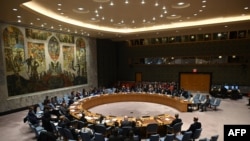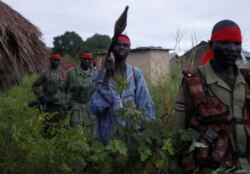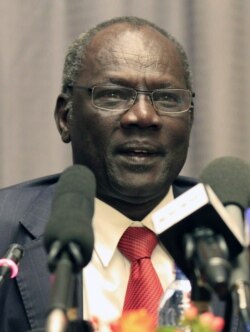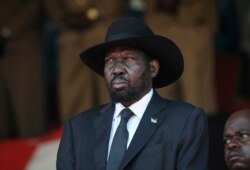The United Nations Panel of Experts on South Sudan is warning that the country’s revitalized peace deal is in jeopardy because the unity government’s partners are bickering over security control and resources rather than moving forward with the deal’s implementation.
The panel told the U.N. Security Council last week that the signatories have failed to meet security arrangement deadlines and are violating terms of the 2018 agreement.
“The selective and incomplete implementation of the security compromises made under the revitalized peace agreement threatens the peace, security and stability of South Sudan. In particular, the signatories to the agreement have not met the deadlines for the completion of the transitional security arrangements, including the expeditious cantonment of forces and the formation, training and redeployment of the necessary unified forces,” the U.N. experts’ report said.
In the 60-page document, the panel accused former government and opposition military leaders of forcefully recruiting civilians, including children as young as 12 years old, to boost the size of their forces heading to cantonment sites.
The U.N. experts said the army and SPLA-IO carried out forced recruitment of children in Koch, Panyijiar and Rubkona in the northwest part of the country.
As a result, the panel said, many young recruits have not left the Bentiu Protection of Civilians site for Dhorbor, the SPLA-IO headquarters, to avoid being transported to the Moum military training center.
Government spokesperson Michael Makuei was unapologetic about the former transitional government’s recruitment tactics.
“Any unit which has a shortage of personnel has the right to recruit. What are they [the U.N. panel of experts] trying to do? Are they the ones to manage the government of South Sudan?” Makuei told VOA’s South Sudan in Focus.
SPLM-IO official Stephen Par Kuol, who also serves as minister for peace building in the transitional unity government, denied the SPLM-IO recruits children.
“We don’t recruit youth and under age. I also read in that document that the [SPLM]-IO are still occupying civilian centers. That is also wrong because there was a time when the government occupied 24 civilian centers and we only occupied one,” Kuol told South Sudan in Focus.
Lam Akol, a member of the South Sudan Opposition Alliance, said new, young recruits are showing up at training centers, which he calls a violation of the agreement.
“Where are the new recruits coming from? There were even lactating mothers! We are not saying women should not be part of the force, but you cannot have lactating women in the training centers because it is exhausting,” Akol told South Sudan Focus.
The parties to the peace deal have slightly more than 45,000 forces, just more than half the full force of 83,000, as stipulated in the revitalized 2018 agreement.
The panel accused the South Sudan army and SPLA-IO commanders of instructing some of their forces to remain outside the security reunification process and to hold on to their weapons in case the country returns to active fighting.
Kuol flatly denied the charge.
“The allegation that some of our commanders are holding back forces, that is not true. The main problem has been the fact that we don’t have the necessities that are needed to have a functioning cantonment sites, through shelters, medicine, and the rest,” Kuol said.
Akol acknowledges that reforms have been slow in coming.
“We said it from the beginning that any transitional arrangement that is based on power-sharing will not deliver the required reforms. Each party will be busy trying to get the maximum resources and control the security sector,” Akol told VOA.
The U.N. experts also said in the April 28 report that the power of National Security Service agents remains unchecked and has been expanded to silence political and civic dissent. It said security operatives continue to arbitrarily arrest and detain civilians and that President Salva Kiir has no intention of restraining the agents’ activity.
Makuei disputes that allegation.
“It is not enough to say security is arresting people arbitrarily. Say it arrested XYZ – you don’t just say they have been arresting people arbitrarily,” said Makuei, calling such statements “old stories.”
The panel says it verified up to 40 detainees at the Riverside prison facility who have never been charged with a crime.











